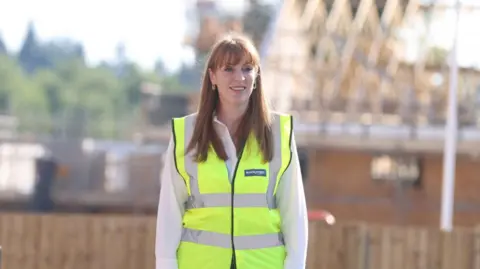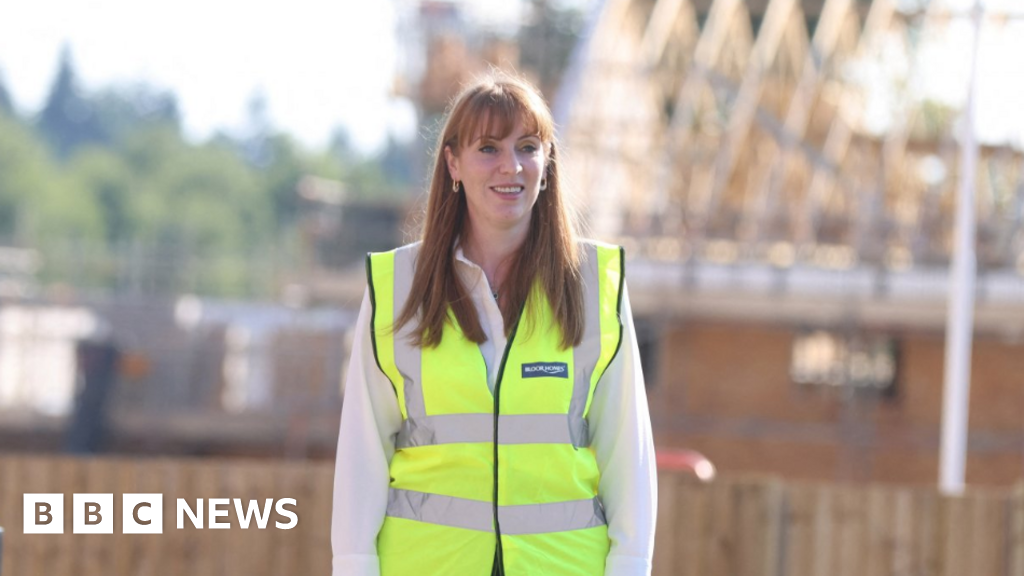 Reuters
ReutersThe deputy prime minister has told the BBC she wants the government’s Right to Buy housing scheme to continue but that it needed to be “fairer” to the taxpayer.
Angela Rayner insisted she was committed to keeping it, as it was important that social tenants were able to buy the homes they had lived in for a long time.
She told the BBC’s Sunday with Laura Kuenssberg programme a consultation would review the rules after she said the previous Tory government had allowed “huge discounts” to be made quicker.
Rayner said it was “fair” that someone should be allowed to buy the home they have lived in their home a long time but that this “has to be levelled against replacing that stock.”
Rayner said she believed there has to be a “balance”.
“The changes the previous government made has made it a lot easier with a huge discount for people to buy the social housing and we just cannot replace them.
“Therefore I have started a consultation because I believe that we should make it more fairer to the taxpayer who help fund social housing so we don’t lose the sites as quickly as we are.”
Since October 1980, council tenants have been able to buy their homes at a discount, which now stands at a maximum of 70% – depending on the length of the tenancy – or £80,900 across England and £108,000 in London boroughs (whichever is lower).
Under Right to Buy, millions of homes have been sold across the country.
But housing campaigner Kwajo Tweneboa described the scheme as “the most damaging policy introduced in respect to social housing”.
On building social stock, he said ministers would have to intervene.
Earlier this year, the Labour mayor of Greater Manchester, Andy Burnham, urged the government to suspend Right to Buy for new homes being built in the city.
“If we don’t, trying to solve the housing crisis is like trying to fill a bath but with the plug out because you try and build new homes but you lose them at the other end,” he told the BBC.
‘Historic legislation’
Rayner was also pressed by Laura Kuenssberg on a Labour election promise to build 1.5m homes by the end of this parliament.
The deputy prime minister was asked how many would be social housing and how many would be council stock.
“I think it is really difficult to put an exact target on that because it depends on whether it is through a new town, access on a site with grey belt or whether it is an urban site,” Rayner said.
“But what I do want to see is the biggest wave of council housing in a generation and that is what I want to be measured on.”
In her conference speech, Rayner drew on her personal background as a single teenage mother to set out what she wanted to do in government.
“It was the foundation of a decent home, secure work and a strong community that nurtured me,” she told party delegates, as she reiterated her commitment to new legislation on workers’ rights.
She said the Employment Rights Bill, to be introduced in Parliament next month, would be a piece of “historic legislation”.
The bill would offer “a genuine living wage and sick pay for the lowest earners” and ban “exploitative zero hour contracts and unpaid internships”, she said.
“This is our Plan to Make Work Pay – coming to a workplace near you.”
On housing, she pledged to “clamp down on damp and mouldy homes” by implementing Awaab’s law and extending it to cover the private rented sector as well as social housing.
The law, named after the toddler who died after being exposed to mould in his home, was passed under the previous Conservative government and compels social housing landlords to carry out certain repairs in a specific timescale.
As part of its bid to build more houses, the government is also planning to introduce planning passports, with the aim of speeding up developments in urban areas.
Rayner trumpeted the government’s new devolution deals, which would see areas including Hull and East Yorkshire and Lincolnshire get new mayors.
‘Let me be blunt’
Rayner’s speech had a hint of celebration, personal anecdotes and plenty of attacks on the Tories.
Her speech was designed to rouse the crowd at the Liverpool conference, and she did get laughs, applause and a standing ovation.
The party is trying to shift the narrative on to the territory they’re keen to talk about – what they’ve already done in government, and what’s coming next.
The deputy prime minister warned her party that the new government faced “tough choices”.
“So let me be blunt. We can’t wish our problems away. We have to face them,” she said.
Since coming into power, Labour have accused the Conservatives of leaving behind a poor economic inheritance and warned that difficult decisions will have to be made.
One of those decisions, cutting the winter fuel allowances for 10 million pensioners in England and Wales, has caused concern among some Labour MPs, activists and trade union backers.
Sharon Graham, head of the Unite union, told Sky News she was worried the government was “walking us into austerity mark 2”.
Keir Starmer has insisted he will not pursue austerity polices, which saw large public sector cuts between 2010 -15, telling the Sunday Mirror, he was “not going down that road”.

